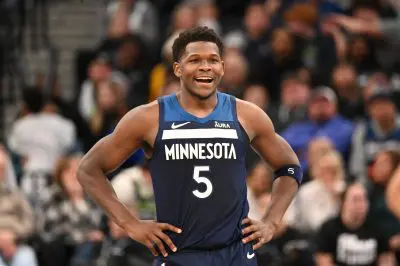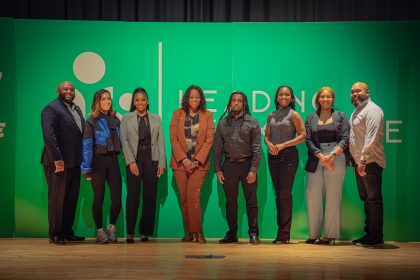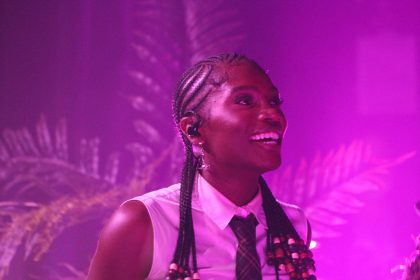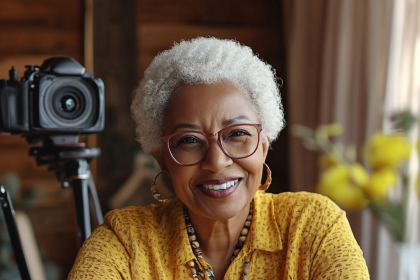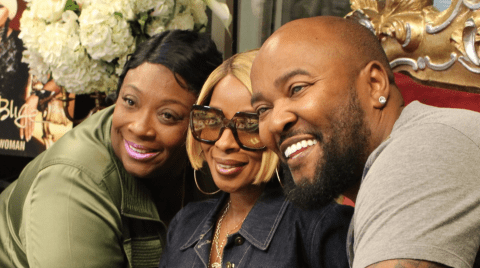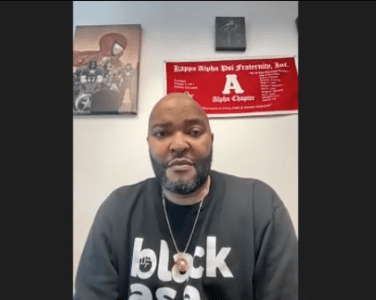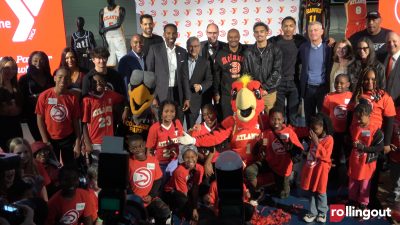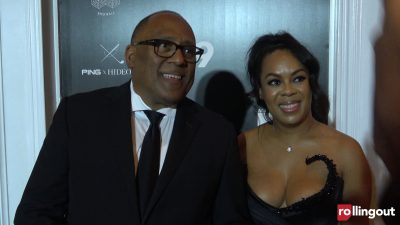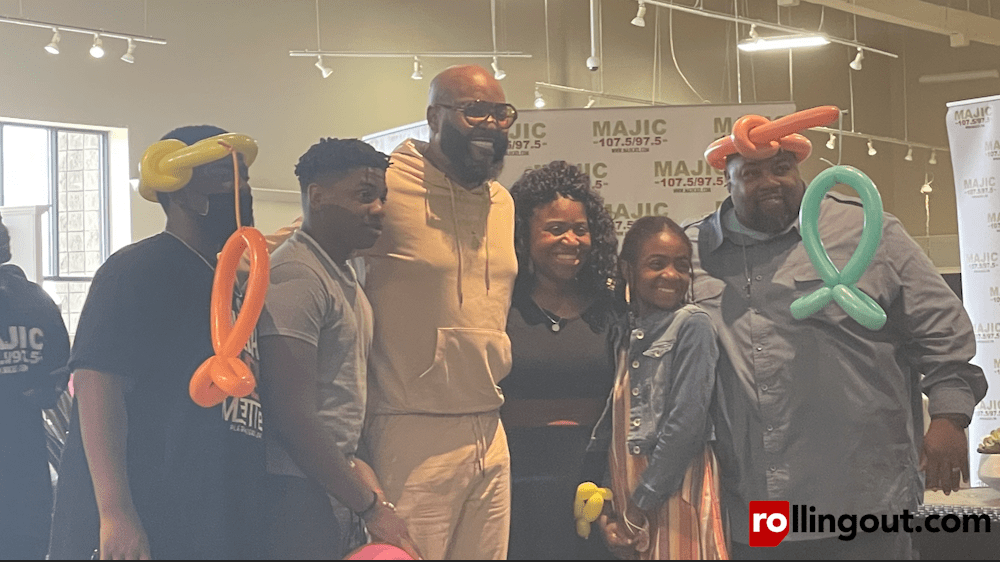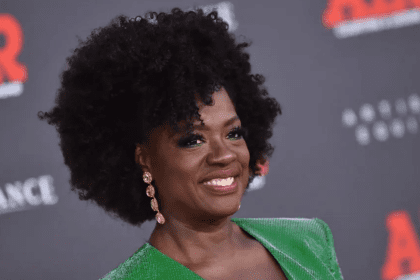
Atlanta radio host Ryan Cameron is taking his philanthropy to new heights with his first Mega Media Boot Camp. The camp will take place on Saturday, June 6 at Center Stage and will be hosted by Cameron and sports correspondent Rachel Baribeau.
Cameron is giving attendees an opportunity to network and listen in on panel discussions featuring top-notch radio, television and business executives, including Steve Koonin, CEO of the Atlanta Hawks; Rodney Harrison, former NFL player and current analyst; Spencer Tillman, former NFL running back and 16 year lead studio analyst for CBS Sports Network’s “College Football Today” pregame show; Jason Steele, creator of the catchy Red Robin jingle; James Hutchinson, SVP of marketing at the Georgia Lottery Corporation; Reggie Rousse, program director for V-103 WVEE FM; and more.
Rolling out recently had a chance to speak with the media mogul to learn about his inspiration for the awesome project. Cameron filled us in on all the details and even gave tips on how to make a name for yourself in an industry that is so competitive. –lauren martinez
Why did you decide to put this media boot camp together?
I am approached about five to 10 times a week by someone who is interested in a career involving television, radio or is considering going back to broadcasting schools to see if they have what it takes to get into the media field. The big issue with school is that it costs a lot of money. The average courses are about $13,000 for three- to six-month courses, and that still doesn’t guarantee you a job. I began to feel like it was sort of a disservice to people who have dreams and aspirations to do what I do, but may not necessarily have the skills or even know if this is the job for them. I think it would be better to find out sooner than $13,000 later.
Who can attend the boot camp?
This is for anyone who is interested in doing voice-overs or being on-air talent. The camp is also for those who produce music that may not specifically understand that you can have just as a successful career getting music on television the same way someone would try to get a beat to Lil Wayne. This is an opportunity for anybody who is in the entertainment industry. This is for people wanting to work on and off camera and who also produce. The camp is open to all ages who are trying to get in the field. Before I had my talent search and discovered Rashan Ali and CJ they were both sitting at a desk somewhere dreaming of something else they wanted to be doing. This is for the person who may not be happy with what they are doing currently. It’s definitely for the number of red carpets I have been on and people are introducing themselves with “this is ya boy and this is ya girl …” The lingo they cling to needs to be ramped up to another level of professionalism if they want to make it further than just on a blog somewhere.
What are your thoughts on networks giving jobs to Instagram and Twitter socialites versus students who are going to school and interning trying to achieve the same success and having to put forth much more hard work?
It’s a gift and a curse because it’s great to see the people who have been discovered off of social media platforms. There are a lot of people like Perez Hilton who has had a very successful career after starting off as a blogger to the Justin Biebers of the world who are YouTube famous. Even the young man who came up with Ish My Dad Says, which went from tweets to turing in to a book and later developing into a television show. On the opposite side, the skill sets you get from hands on experience with a college or a learning institution can tell you the ends and outs of the business. The people who are on these panels have experience and numerous awards with a pedigree of success. I recently posed a question to students at the University of Georgia who are in the journalism program at the school. I asked if someone could take their experience and pour it into you how many people do you think would make fewer mistakes and they all raised their hands. You can’t get that type of information from YouTube videos that have popularity, because it comes from trial and error.
How important do you feel networking is?
I think networking is a term that has been glorified, but has also been underused. A good networking event is something that turns into a contact or partnership opposed to passing out pieces of paper hoping to see that person again. That is the total opposite of what we are trying to do with the camp. Everyone on these panels is established and they are people who can have the power to hire you on the spot.
How did you select the panelists?
We went out and picked the movers and shakers in the industry. Reggie Rouse is the vice president for the entire CBS Programming for radio and he can say your hired. Steve Koonin is a former network executive at the top of the food chain for Turner Broadcasting and he can also say your hired. We have a guy coming in from the music side who created the Red Robin music theme. He has hundreds of placements on television, which is an avenue and field people aren’t even thinking about. We are trying to bring experience to the table, but also showcase other opportunities that people need to hear about. Everybody that we picked is a decision maker and very well off in their chosen field. These are the people who sign the actual contracts so there’s nobody higher on the food chain. I think the people you want to hear from are the people who make the decisions as oppose to whimsical people who make decisions based off emotion.
What advice would you give young people trying to get established in the industry?
One of the main mistakes that people make coming out of college is not having any material that shows what they do. Anybody they meet in the industry is going to ask them to send them something, whether it be a reel, audio for a voice-over, or writing samples. If there is opportunity for you to pay to have your reel professionally done, take it, because it is much better than you doing it on your phone or webcam.
How did you get your start in the industry?
I got my start through interning. The internship programs I began with are no longer in existence because of lawsuits filed from previous interns who felt they should have been paid like an employee. Companies are running for the hills and not doing internships. The sad part is that most of the people that I work with in the industry would not be here had it not been for the internships that they were doing when we were young. The climate of lawsuits has changed the entire internship perspective for anybody in this field. If I had started out in 2015, I would not stand a chance today.
Do you feel internships should be paid?
I can’t speak on being paid because I came from a time where I wasn’t paid.



